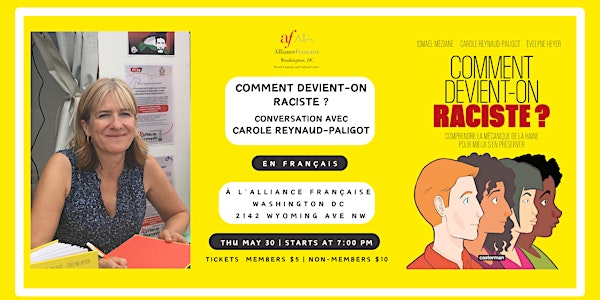À propos de l'évènement
Rejoignez-nous à l'Alliance Française le jeudi 30 mai à 19h00 pour une discussion avec Carole Reynaud-Paligot autour de la BD et de l'épineuse question : Comment devient-on raciste ?
Les portes ouvriront à 18h30. Votre billet comprend un verre de vin de bienvenue.
La conversation sera suivie d'une séance de questions-réponses.
Il n'y aura pas de réception après l'événement.
A propos du livre BD
À de multiples reprises, Ismaël Méziane a vécu personnellement le racisme.
En 2017, lorsqu’il visite l’exposition « Nous et les Autres » au Musée de l’Homme à Paris, c’est un véritable choc qu’il a aussitôt envie de partager. Il entreprend alors de réaliser une bande dessinée avec les deux commissaires de l’exposition, Carole Reynaud-Paligot, historienne et E. Heger, anthropologue geneticienne.
Sous forme de déambulation, il propose un mélange de réflexions personnelles et d’échanges avec ces deux spécialistes afin de comprendre en profondeur les mécanismes à l’origine du racisme.
L’album entremêle savoir et émotions pour susciter une prise de conscience, qui reste malheureusement plus qu’utile aujourd’hui.
A propos de Carole Reynaud-Paligot
Carole Reynaud-Paligot est diplômée de l'Institut d'études politiques de Grenoble, docteur (EHESS), HDR, (Panthéon-Sorbonne, Paris 1).
Carole Reynaud-Paligot enseigne la sociologie et l'histoire à l'université de Bourgogne depuis 2018. Auparavant, elle a enseigné à l'Université de Franche-Comté et dans les antennes parisiennes d'universités américaines (University of New York, University of California) et de Sciences po Paris.
Elle est également chercheur au Centre de recherche en histoire du XIXe siècle de l'Université de Panthéon-Sorbonne, Paris 1.
Elle a assuré le co-commissariat scientifique de l'exposition " Nous et les Autres, des préjugés au racisme " qui s'est tenue au Musée de l'Homme à Paris en 2017-2018 et qui circule actuellement en France et à l'étranger sous des formes itinérantes.
Spécialiste de l'histoire des intellectuels et de l'histoire des processus de racialisation, elle a notamment publié : La République raciale. Une Histoire, PUF, " Quadrige ", 2021 ; L'École aux colonies entre mission civilisatrice et racialisation 1815-1940 (2020, Champ Vallon), 2020, et un ouvrage de bande dessinée : Ismaël Méziane, C. Reynaud-Paligot, E. Heyer, Comment devient-on raciste ?, Casterman, Bruxelles, 2021.
About the event
Join us at the Alliance Française on Thursday May 30 at 7:00 pm for a discussion with Carole Reynaud-Paligot about comics and the thorny question: How does one become a racist? With the aim of understanding the mechanics of hatred, to better protect ourselves from it.
About the comic strip
Ismaël Méziane has personally experienced racism on numerous occasions.
In 2017, when he visited the "Nous et les Autres" exhibition at the Musée de l'Homme in Paris, it was a real shock that he immediately wanted to share. So he set about creating a comic strip with the exhibition's two curators, a genetic anthropologist and a historian.
In the form of a stroll, he offers a mix of personal reflections and exchanges with these two specialists, in order to gain an in-depth understanding of the mechanisms at the root of racism.
The album combines knowledge and emotion to raise awareness, which unfortunately remains more than useful today.
About Carole Reynaud-Paligot
Carole Reynaud-Paligot is graduated of the Institute of Political Studies in Grenoble, doctor (EHESS), HDR, (Panthéon-Sorbonne, Paris 1).
Carole Reynaud-Paligot has been teaching sociology and history at the University of Burgundy since 2018. Before, she has taught at the Université de Franche-Comté and at the Paris branch offices of American universities (University of New York, University of California) and Sciences po Paris.
She is also researcher at the “Centre de recherche en histoire du XIXe siècle” of the Université de Panthéon-Sorbonne, Paris 1.
She was scientific co-curator of the exhibition “Nous et les Autres, from prejudice to racism” which took place at the Musée de l'Homme in Paris in 2017-2018 and which is currently circulating in France and abroad in itinerant forms.
Specialist in the history of intellectuals and the history of racialization processes, she notably published: La République raciale. Une Histoire, PUF, „Quadrige“, 2021 ; L’Ecole aux colonies entre mission civilisatrice et racialisation 1815-1940 (2020, Champ Vallon), 2020, and an Comics book : Ismaël Méziane, C. Reynaud-Paligot, E. Heyer, Comment devient-on raciste ?, Casterman, Bruxelles, 2021.
Event Format
Doors will open at 6:30 PM. Your ticket includes a welcome glass of wine.
The conversation will be followed by Q&A .
No reception after the event.
